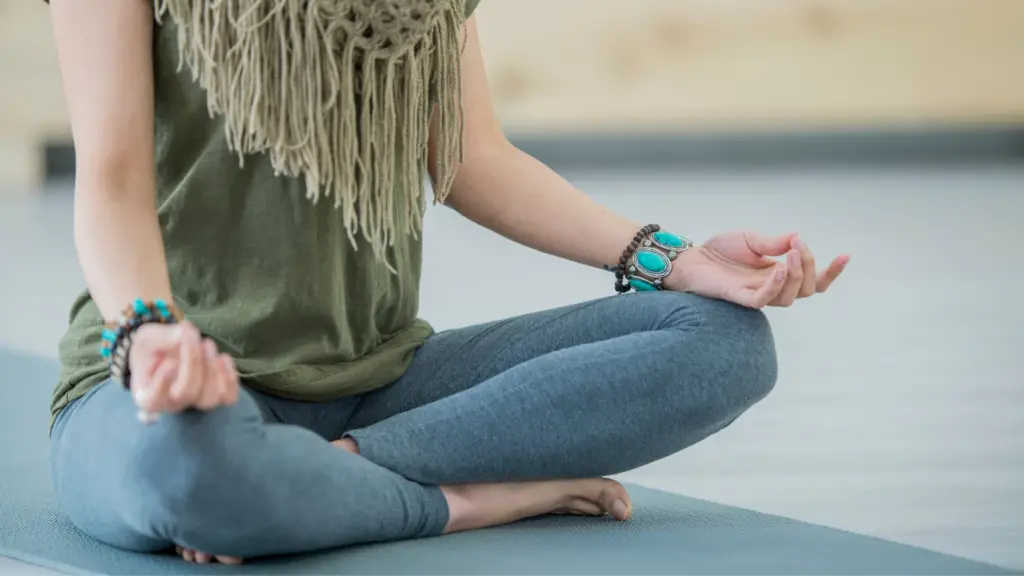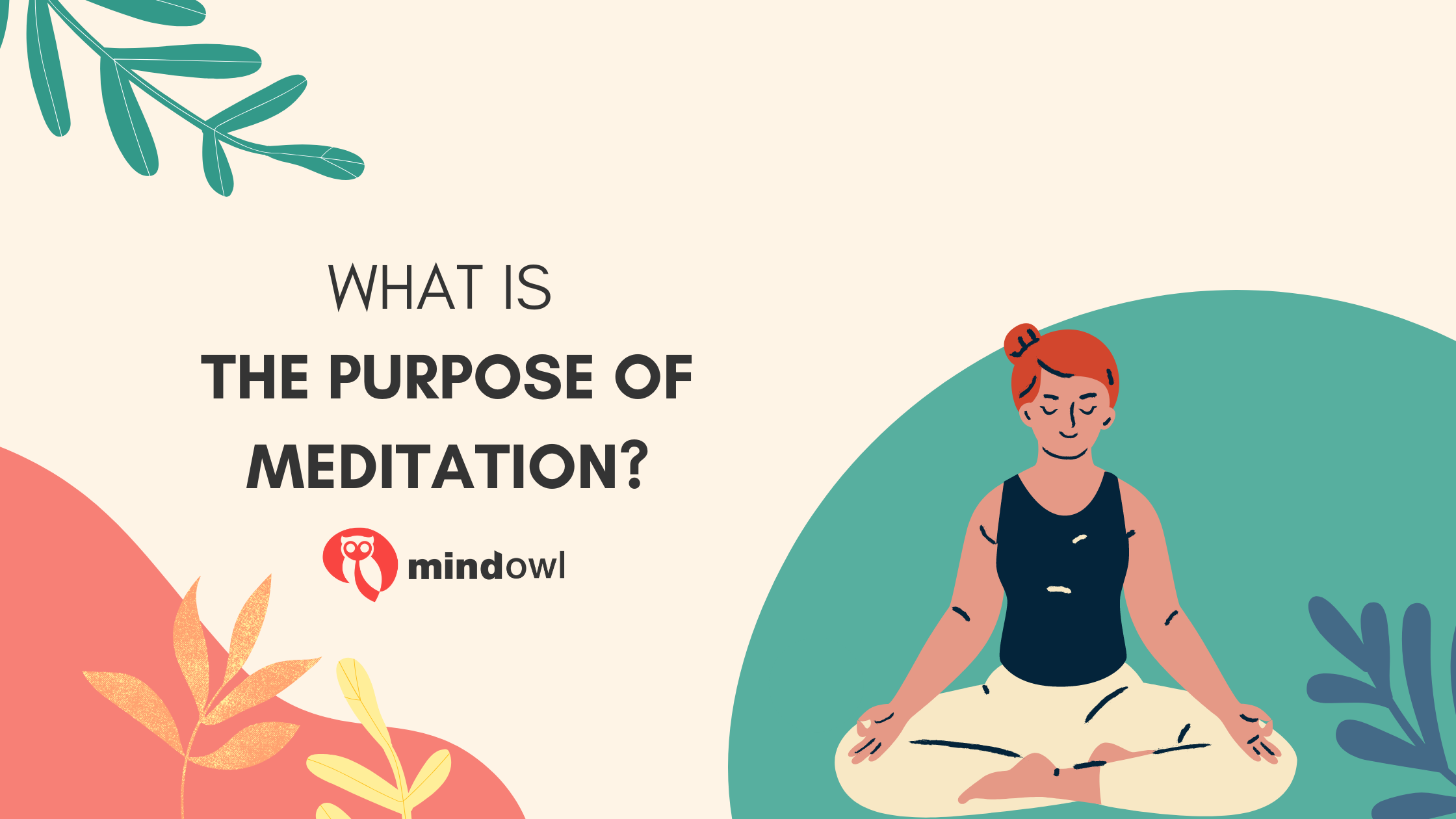You could be wondering what is the purpose of meditation?People practise meditation for a number of different reasons. Many are enticed by the various physical health benefits, while others may want to experience a deeper sense of peace and relaxation. For some, meditation practices may offer a chance to connect with a sense of spirituality or faith.
Whatever causes your interest in meditation and mindfulness practices, know that it is valid. While many people believe that meditation is about transcending your environment, removing yourself from your thoughts and feelings and achieving a state of bliss, setting yourself high expectations like this can lead to disappointment. This kind of enlightenment or awakening remains the ultimate goal of meditation for some; however, these sorts of lofty ambitions by no means apply to everyone.
Reasons to meditate
Even if you feel perfectly happy, healthy and calm on the surface, meditation practices may still benefit you immensely. Think of neglecting your mind and body as you would neglecting your housework. After a while, dirt, junk, and mess will pile up, and by the same token, negative thoughts and emotions, stresses and anxieties can grow and become overwhelming over time. By implementing meditation practices, we can reduce the risk of this happening. However, this may seem a little vague and long-term. What are the other tangible and proven benefits of meditation?
Increased empathy and compassion
Within many Buddhist practices, the main objective of meditation is to enhance empathy and compassion. By calming the mind and improving attentiveness, we can learn to treat others with more kindness, patience and respect. This idea is harnessed by compassion meditation exercises such as Loving-Kindness Meditation and Tonglen, which focuses on cultivating love and compassion towards yourself and others. After all, it is an inherent truth that only by practising self-care and self-compassion can we extend these behaviours towards other people. Surely this is as good a goal as any to get started?
Less reliance on external sources of happiness
Most people look to find happiness from external sources such as relationships, money and recognition. When things go our way, this may be effective. However, when our happiness relies on circumstances we can’t control, we’re ultimately setting ourselves up for failure. External factors are ever-changing, so over-dependence on them can cause our mental and emotional states to be highly turbulent. One of the most positive effects of meditation is that it encourages us to find happiness within our minds instead of relying on external sources. Bringing into focus the fulfilment the mind can provide can ultimately make us much healthier and happier.
Improved sleep
Yes, many types of meditation can lead to improved sleep. Mindfulness meditation is proven to reduce fatigue, insomnia and depression after just a month of practising. A calmer, less cluttered mind makes a good night’s sleep a lot easier to come by. That being said, certain types of meditation may be better suited to tackling any sleep issues you have. For more guidance on this, check out this article on the best meditative techniques for improving sleep.
Unlock your subconscious mind
Our active thinking and decision-making is done by the conscious mind, which processes a single thought at a time and does not store long-term memory. A key benefit of meditation is a decreased tendency for distraction; this can lead to a greater connection with the subconscious mind, often a useful source of ideas, solutions, inspiration and creativity. By giving our conscious minds the means to take note of the natural inventiveness stored inside the brain, we can unlock hidden potential and enhance our ability to deal with difficult situations and think outside the box.
Greater calmness and peace of mind
By using mindfulness meditation to note and address your negative thoughts and emotions, you can devise ways of coping with them in the future. Techniques such as Transcendental Meditation can help give relief from worrying thoughts, by focusing the mind on the repetition of a mantra, like ‘ohm’. This form of meditation can help instil a deeper sense of calmness and peace of mind, by providing a fixed anchor for your session. For more on Transcendental Meditation, check out this article.
Studies suggest that mindfulness meditation actually rewires the brain physically. The areas of the brain linked to calmness, cognition and happiness have been known to expand thanks to daily practice, while the sections of the brain responsible for anxiety, depression and poor concentration decrease in size. This brings us to our next point.
Reduced stress and anxiety
Most forms of meditation ask you to ground yourself in the present. This is a particular concern within mindfulness, which can make you calmer and more level-headed by prompting you to acknowledge your thoughts, feelings and sensations in the present moment, without necessarily reacting to them.
Mindfulness meditation seeks to change the way we observe and act upon our thoughts, feelings and instincts by expanding our conscious awareness and helping us dissociate from our reactive side. By tuning our minds to the present, we are less likely to be overwhelmed by stress, anxiety or negative concerns about the past or future. Ultimately, the process of gaining insight into our experiences of stress, anxiety or worry helps us learn how to combat such problems when they arise in the future.

What makes meditation different from relaxation?
Many of us are drawn to meditation due to its associations with relaxation. While the long-term effects of practising meditation often include a more relaxed, level-headed attitude to life, it is important to realise that the actual practice itself is often the opposite of relaxing. Taking part in a meditation session can be an incredibly frustrating experience, because it forces you to repeatedly concentrate on your wandering thoughts, and attempt to refocus your mind. This mind training process is far from relaxing.
Is relaxation the real purpose of meditation?
When it comes to maintaining our ability to function healthily, relaxation is incredibly important.
When we feel stressed, the sympathetic nervous system springs into action. Our bodies release adrenaline and cortisol, which lead to physical and mental manifestations of stress like sweating, heart rate increase, or tension headaches. Relaxation practices attempt to counter these physical responses by slowing down the heart rate, stabilising our breath, and moving our minds away from the subject responsible for the stress.
However, it is important to note that relaxation and meditation are not one and the same. Breathing exercises, yoga and hypnosis are useful techniques specifically designed to reduce stress, while certain activities individual to our personalities (like reading a book or exercising) can also help produce a relaxed state of mind.
Still, there is a distinct difference between the sense of calm these techniques can generate and the kind of long-term clearness and insight we associate with mindful meditation. As discussed above, this type of meditation provides us with greater insight into how our minds work. Investing the time in mindfulness meditation practice, rather than just relaxing vacantly, can help us tackle negative thoughts and emotions in the long run. Our article on why meditation is so much more than just relaxation goes into further depth on this subject.
What does enlightenment mean?
In the Buddhist tradition, the ultimate goal of meditation is to reach enlightenment or awakening. This means awakening to the true nature of experience and ending dukkha, or suffering, thus reaching the end of the cycle of death and rebirth.
However, modern Western interpretations of meditation have moved away from ancient Buddhist traditions. This is partly due to varying cultural beliefs about life and death. For many people today, meditation is not a spiritual practice, rather just a method of relieving some form of stress or suffering. It can offer a set of tools to help tackle physical, mental or emotional health issues such as insomnia, high blood pressure, anxiety, depression or addiction.
Certain ideas regarding enlightenment can cause people to think that meditation is all about removing yourself from your thoughts and feelings and finding a persistent state of calm or bliss. In fact, the practice of meditation is far simpler than that.
The real purpose of meditation
It is important that we dispel the erroneous idea that the purpose of meditation is to reach some form of eternal bliss, separated from day-to-day realities. The main goal of meditation is simply to foster well-being and reduce suffering. If we just shift our expectations slightly, we can begin to find meditation more fulfilling.
As we’ve discussed, the practice of meditation does not seek to remove negative or chaotic thoughts and emotions. Instead, it helps increase your awareness of the chaos of your aliveness, and learn how to live with it. Each of us has thousands of conflicting thoughts every day, and it is important that we don’t define or judge ourselves in relation to particular thoughts or ideas. As Buddhist teacher Reggie Ray says, “the purpose of meditation is to make room for your own chaos”. By embracing your mind’s chaotic nature, you can better understand and cope with all the external chaos that is part and parcel of life.
Meditation techniques like focusing on physical sensations and mindful breathing can help carve out space between thoughts and actions. Creating this space can improve relationships and interactions with others, reduce feelings of regret, and increase clarity and intentionality, whilst simultaneously producing a whole host of other improvements to your physical and mental health.
There is no formal way to measure progress when it comes to mindfulness. It is a very gradual process, whereby you will hopefully begin to find yourself acting less reactively and more thoughtfully throughout your daily life. By sparing a few minutes each day, you can begin to make a dent in negative thoughts and behaviours, which can build towards significant positive changes in your life.
MindOwl Founder – My own struggles in life have led me to this path of understanding the human condition. I graduated with a bachelor’s degree in philosophy before completing a master’s degree in psychology at Regent’s University London. I then completed a postgraduate diploma in philosophical counselling before being trained in ACT (Acceptance and commitment therapy).
I’ve spent the last eight years studying the encounter of meditative practices with modern psychology.




3 thoughts on “What is the purpose of meditation?”